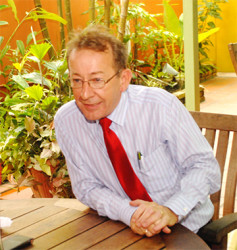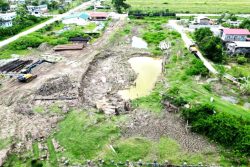President of the Tourism & Hospitality Association of Guyana (THAG) Shaun McGrath has told Stabroek Business that the reduction of the Value Added Tax (VAT) on goods and services associated with the industry would significantly reduce the cost of the tourism product for visitors and locals alike.
“Tourism is the only export industry where VAT is applied. We deserve to be treated like an export industry. Our taxes on tourism are amongst the highest in the world,” McGrath said, adding that one of the benefits that will accrue from the removal of VAT from the sector would be that it would make internal tourism more affordable for Guyanese residing at home.
Meanwhile, McGrath, who is also Chief Operations Officer of Cara Hotels disclosed that THAG has been charged with administering a national tourism development fund which accrues from a contribution of US$1.00 per day per room garnered from guests at local hotels. “It is entirely voluntary and while it is placed on guests’ bills, it is immediately removed if they are not inclined to accept the charge. Sixty per cent of our guests are more than happy to accept it,” McGrath added.
The Fund, which has been in place since April this year and which is used to help finance management, capacity building and product development in the sector is, according to the THAG President a common feature in the region. He said that the industry in Barbados raises around US$1 million annually from the ‘charge.’

Guyana’s tourism sector is, according to McGrath, anticipating a significant boost in the period ahead arising out of the anticipated draw down by the sector of around US$4.5 million in funding under the LCDS/GRIF fund. McGrath told Stabroek Business that following a lull in discussions with government over accessing the funds the issue was now ‘back on the front burner.” It is anticipated that the tourism sector will access some US$3 million of which 50 per cent will be allocated for the first year of implementation of a plan prepared by the British firm Acorn Tourism to produce a new national destination brand.
Tourism Ministries have commissioned Acorn Tourism to produce branding and marketing strategies, undertake institutional reviews, develop tourism statistics, development programmes and international visitor surveys and create Tourism Satellite Accounts (TSAs), in several countries including Albania, Barbados, Botswana, Guyana, and St. Vincent and the Grenadines.
McGrath said that the Acorn destination brand proposal for Guyana was particularly designed for a country with a small budget.
The sector, meanwhile, according to McGrath has been energized by the appointment of Cathy Hughes, whom McGrath described as “one of us” as Minister of Tourism. “We now have friends in high places,” quipped McGrath mischievously.
And according to McGrath one positive development from which the tourism sector has benefitted in recent years was government’s recognition of those areas in which the private sector had demonstrated a proven competence.
He said that this had resulted in a strengthening of the relationship between government and THAG and had also resulted in “a stronger more robust THAG which has created, among other things a new website and booking engine.
Asked about the training of staff to meet the needs of the sector McGrath said that while last year’s announcement by government regarding the planned establishment of a Tourism School had not materialized up to this time, THAG was seeking to redouble its lobby for the creation of the facility which it hoped would be patterned after the Barbados Hospitality School.
And according to McGrath the tourism sector in Guyana continues to be seriously challenged to recruit quality staff. “Unfortunately, the reality is that many people still do not see the tourism sector as providing a genuine occupation.
The Cara Lodge will be celebrating its twentieth year next year and around 60 per cent of the staff have been here for 10 years or more. We have tried to recruit people with the right attitude and train them since what we have discovered is that while you can train people in the skills you cannot train them to be nice,” McGrath said, adding that locals are likely to understand the sector better if, like Barbados, we teach tourism as a subject from the primary school level.









